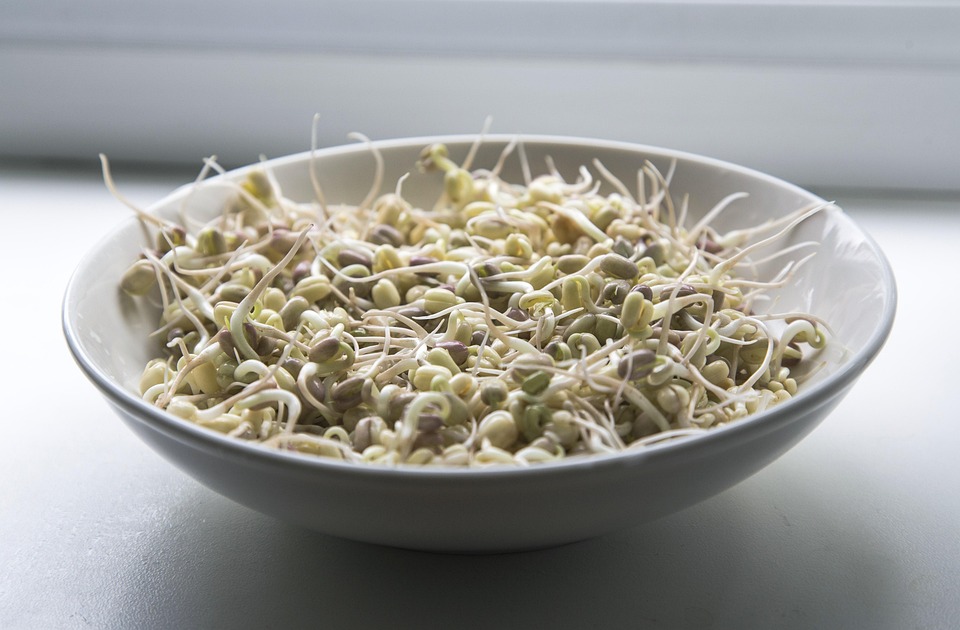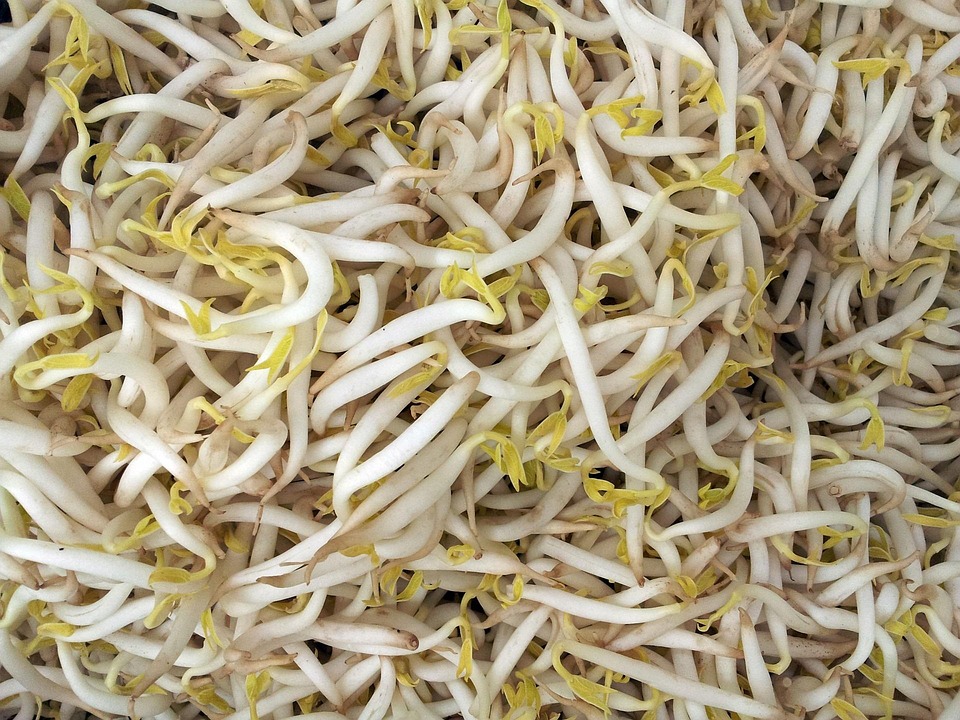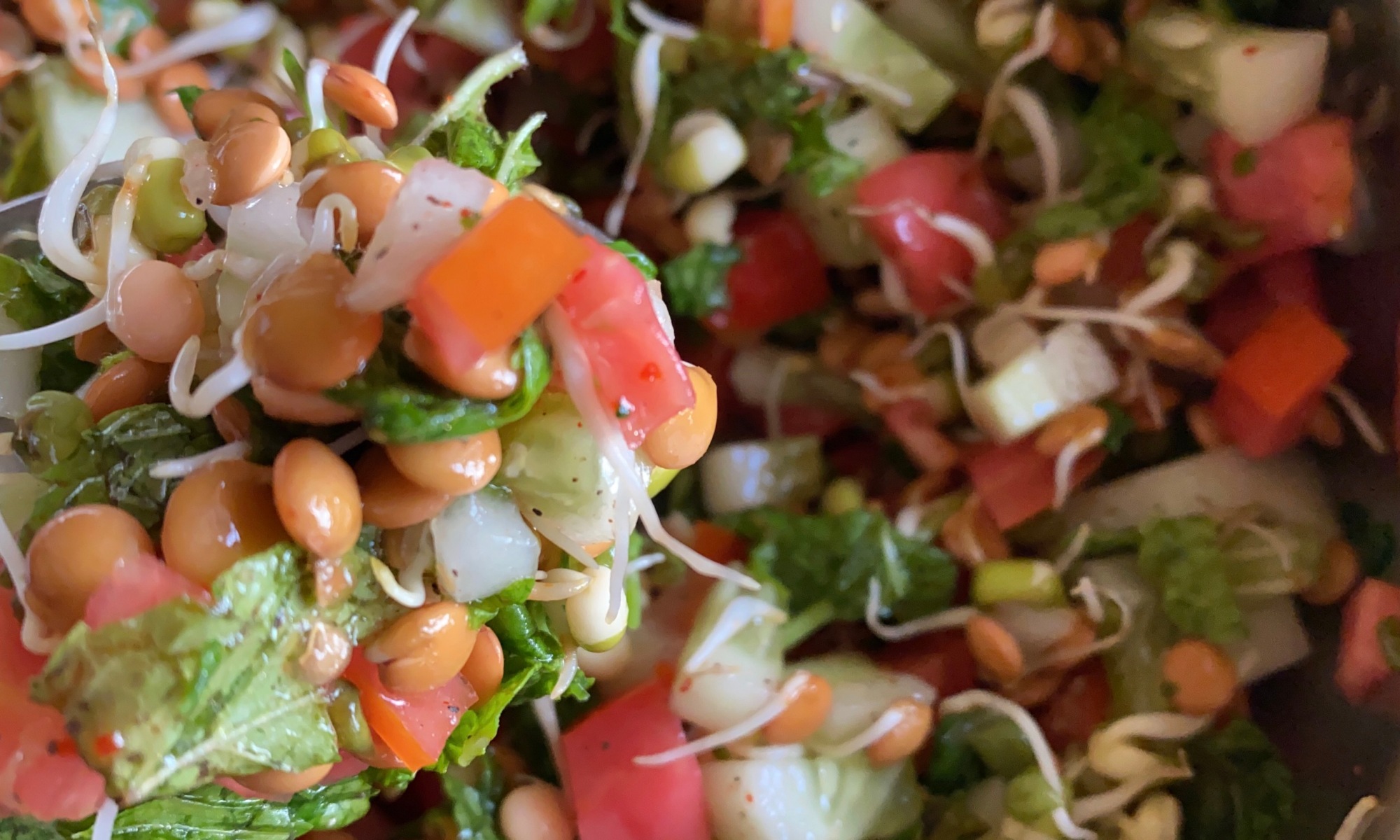In today’s post, I am going to tell you all about sprouts. The what, when, how, why and which of the sprouting world. So keep reading if you want to know the benefits of sprouting seeds, the process of sprouting, who can eat, safety & concerns, equipments, easiest ways to sprout, what seeds to sprout along with a super delicious recipe that you will love!

WHAT ARE SPROUTS?
A sprout is a small growth that occurs in a seed when they crack open to let the stalk comes out of it. Simply put sprouting is essentially the practice of germination of grains, legumes, beans, nuts or other kinds of seeds to make them easier to digest and to help your body access their full nutritional profile. In traditional Indian Ayurveda, the use of sprouted beans dates all the way back to 1500 BC.
WHO CAN EAT SPROUTS?
Yes, anyone can and should eat sprouts. In Ayurveda, sprouts are generally good for all doshas, but they are said to be best for pitta and kapha. Vata is constituted by space and air – which is the energy of movement; Pitta constitutes fire and water constitute – the dosha of digestion and metabolism; whereas water and earth make up kapha – the principle of structure and lubrication. If eaten in the right quantity and at the right time in the right way, you will reap astonishing benefits.

WHY ARE SPROUTS A SUPERFOOD?
A sprouted seed is much more nutritious than a regular seed as it contains all the elements a plant needs for life and growth. The energy contained in the seed, grain, nut or legume is ignited through soaking and sprouting. With increased amount of protein, fibre, antioxidants, enzymes, vitamins and minerals, sprouts hold the power to replace your daily multivitamin pills. The nutrients in a sprouted seed gets enhanced by as much as 400% making them one of the healthiest foods on the planet that can be prefixed with ‘super’ and therefore earns the title of being called a superfood!
WHAT ARE THE BENEFITS?
- LIVING FOOD
Sprouts are living foods that are fresh and natural. Any living food like fresh fruits and vegetables also have a rich amount of enzymes and enzymes support our digestion, reduce inflammation and help with joint health too. In modern times, these delicious health-giving sprouts are becoming more and more popular in the western countries too due to the health benefits they provide. Eating sprouts is thus an excellent way to get more of these important nutrients. - DIGESTION & ABSORPTION
Ayurveda stresses the importance of soaking and sprouting grains, beans, lentils, nuts and legumes and this is because, in order to sprout a seed you need to add water; and water breaks down the enzyme inhibitor in the seed, making it easier to digest and even more nutritious. Raw seeds are literally sleeping and the only way to wake them up is to soak them. Phytic Acid is an anti-nutrient that impairs the absorption of iron, zinc, calcium and may promote mineral deficiencies as well. Sprouting neutralises or inactivates these phytic acids from the seeds to not only make it better digestible but also absorb nutrients in a better way. So if you’ve ever had trouble digesting a particular grain or legume, try sprouting it the next time. You will be surprised to see that sprouted beans or grains don’t bother your body at all! - PROTEIN SOURCE
Protein is essential for the nourishment of hair, skin, muscles and body tissues. The nutritional value of protein improves during the soaking and sprouting process. Lentils and beans which are otherwise an incomplete source of protein, the act of sprouting makes them abundant in all 9 essential amino acids, thus making them a complete source of protein. Experts estimate that there can be up to 100 times more enzymes in sprouts than raw fruits or vegetables. Enzymes are special types of proteins that act as catalysts for all our bodily functions. These enzymes help the body extract more vitamins, minerals, amino acids and essential fatty acids from the foods eaten, thus ensuring the body has the nutritional building blocks of life to help bodily processes work more effectively. The quality of the protein in the beans, nuts, seeds or grains is thus at its best when sprouted. The amino acid lysine, for example, which is needed to prevent cold sores and to maintain a healthy immune system increases significantly during the sprouting process. So, include sprouts in your diet, especially if you are vegetarian or vegan. - FAT LOSS
Sprouts are very low in calories and at the same time can keep you feeling full for long. Sprouting also substantially increases the fiber content of the beans, nuts, seeds or grains. Fiber is critical to weight loss. It not only binds toxins from our body to escort them out, but also ensures that any fat our body breaks down, is moved quickly out of the body before it can be reabsorbed through the walls of the intestines, which is the main place for nutrient absorption into the blood. It also helps push bowels from the large intestine. Essential fatty acid content increases during the sprouting process. Most of us are deficient in these fat-burning essential fats because they are not common in our diet. All these super rich properties help in effective fat loss! - ALKALISING
An alkaline body is a clean system that is able to play a vital role in maintaining natural immunity and optimum health. Sprouts are alkalizing to your body. They support our immune system and also assist in purifying the body, due to their alkalizing effect. Many illnesses including cancer have been linked to excess acidity in the body. Don’t forget to eat sprouts regularly as they are nature’s wonder food, rich in the essential alkaline minerals and one of the most nutrient dense foods we can eat. - NUTRITIONAL VALUE
Eating a handful of sprouts daily will increase the nutritional value of your diet. They supply us with vitamins, minerals, antioxidants, omega-3 fatty acids, protein and chlorophyll. Research indicates that sprouted seeds have extremely higher content of nutrition than raw seeds. The vitamin content of some seeds, grains, beans or nuts increases by up to 20 times the original value with only a few days of sprouting. Research also shows that during the sprouting process, beansprouts increase in vitamin B1 by up to 285 percent, vitamin B2 by up to 515 percent and niacin by up to 256 percent. When sprouted, most seeds provide us with a good amount of vitamin A, B, C and E, calcium, phosphorus, biotin, potassium, magnesium, iron, zinc and many other minerals. During sprouting, alkaline minerals like calcium and magnesium bind to protein in the seed, grain, nut or bean, making them more usable in the body. This also helps balance our body chemistry promoting better health. - LOCAL & INEXPENSIVE
When you grow them yourself you are not only helping the environment but also ensuring that you are not getting unwanted pesticides, food additives and other harmful fat-bolstering chemicals that thwart your efforts in following a healthy lifestyle. Most of us also frequently use the cost of healthy foods as an excuse for not eating healthy. But sprouts being so cheap, there really is no excuse for not eating healthier. Sprouts truly are the best locally-grown food, but sadly not enough people eat or grow them. - OTHER BENEFITS
Sprouts in the long run, have proved to be beneficial to many people in many ways. Apart from the ones previously mentioned, here is a list of other benefits:- Strengthens the immune system
- Reduces acidity
- Great for the heart
- Good for your eyes
- Boosts blood circulation
- Reduces allergic reactions

WHAT SEEDS CAN BE USED FOR SPROUTING?
Generally, most edible grains can be sprouted, such as grains, seeds and legumes. Avoid sprouting Kidney Beans (Rajma) for raw consumption. They contain a toxin that may cause nausea, vomiting or diarrhea in some people. Quinoa on the other hand, contains a high concentration of saponins, which in some cases can cause a strong allergic reaction. Some seeds like Soybeans are non-sproutable in nature as they become sour if kept moist for too long. So avoid these. Some of my favorites are Mung Beans (Moong), Wheat (Gehu), Peas (Vatana), Chickpeas (Kabuli Chana), Black Eyed Peas (Chawli), Moth Beans (Matki), Red Lentils (Masoor), Horse Gram (Kulath), Brown Chickpea (Kala Chana). If you didn’t know, whole green mung beans are the beans used to make ‘bean sprouts’. You can also try sprouting mustards, alfalfa, fenugreek, lentils, chickpeas, adzuki beans if they are available. So there are just so many options!
Ensure that the grains, seeds or legumes you are using for sprouting are of fine quality, preferably organic or wildcrafted. Avoid those that are chemically treated as this affects the germination rate.

WHEN & HOW TO CONSUME?
It is no surprise to see so many digestive and dietary aids for stomach, along with pills for gas and indigestion, on the market. Most of these conditions likely begin with poor food combining. Ayurveda, an ancient holistic science of healing, offers a logical approach for determining a diet based upon the elements comprising an individual’s constitution – vata, pitta and kapha. This approach is quite different from the contemporary view of a balanced diet, based on eating from various food groups. Ayurveda believes that the gastric fire or agni in the stomach and digestive tract is the main gate through which nutrients enter the tissues and then pass along to individual cells, to maintain the life functions. And this brings us to these key points that should be considered before including sprouts in your diet.
Since sprouts are living foods full of enzymes and hormones, extreme care should be taken with respect to when, how and how much one should consume them. Such foods tend to react with our body if not taken correctly. To avoid reactions like flatulence, acidity, bloating and other digestive issues and to get the desired nutrition from them, it is important to consume sprouts the right way.
- Have only raw fruits or vegetables with sprouts. Ayurveda tells us that we should not combine raw foods with cooked foods because raw foods take longer to digest, whereas cooked food take lesser time to digest. And therefore this poor combining of foods can lead to indigestion, fermentation, putrefaction and gas formation and, if prolonged, can lead to toxemia and disease.
- This also means that sprouts should be strictly consumed raw. Never cook, heat or boil sprouts. You may be surprised to know but heating sprouts even for a few seconds, takes away all its nutrition. Boiled sprouts are nothing but fibre. So always eat your sprouts raw.
- Anything eaten in excess can cause unpleasant side effects and the same goes with sprouts. Limit your intake to not more than 4 tablespoons. Eating more than this at once may cause digestive issues. So just because it’s a superfood, doesn’t mean you can go overboard with sprouts.
- Never eat sprouts after a meal or with meal. Sprouts are a meal in itself. So eat them on an empty stomach for proper assimilation. You can have this for breakfast loaded with other raw veggies, before meals or as an evening snack.
- After the seeds have sprouted, consume them within 2 days.
You are good to go, if you follow the above. You will get the most out of this superfood and at the same time avoid zero nutrition or digestive issues. Considering the numerous health and environmental benefits, it’s time to consider adding sprouts to your diet.

WHAT DO I NEED TO START SPROUTING?
Sprouts are one of the easiest foods you can grow indoors. They barely need any space. if you can fit a bowl or jar on your counter, you have enough space! You also don’t require any special equipment. They need absolutely no sunlight! Growing sprouts is effortless and low maintenance too. Here is a veggie that everyone can and should grow. Sprouts are an easy, cheap and tasty vegetable, anyone can grow.

MAKE SPROUTS AT HOME!
- To sprout, you don’t need much – just a jar or container and pure water can do.
- Make sure to use organic and locally available beans for sprouting.
- Wash them thoroughly a couple of times until the water runs clear.
- Use a large steel or glass container for soaking.
- Add these beans in enough water. Cover and soak for at least 10 hours or overnight.
- Use 4 times water since the beans will absorb the water and double up sometimes even upto 8 times the original size.
- The next morning, drain the water.
- You can also use this nutritional water for making soups, curries, add it to your dough or use it to water your plants.
- Now cover and keep these moist beans in a dark place.
- I usually keep it in the same bowls used for soaking and store inside a microwave oven because it’s dark and cosy. You can keep it on the counter away from sunlight.
- You can also use a sprout bowl, a mason jar or a strainer covered with a wet cloth or just a wet cloth tied up loosely. Anything works, really!
- Every 8-10 hours I check my sprouts, shuffle a little.
- Sprouts need adequate air flow. So if you are using a mason jar, don’t suffocate them by adding too many. They multiply in size!
- If your sprouts look dry, sprinkle a little water. Don’t overwater, unless you want them to rot.
- Sprouting varies according to the temperature and humidity but in most common cases, the seeds are germinated and ready to eat in 2 days.
- Sometimes I wait for an additional day for the sprouts to grow longer.
- But don’t keep for too long. They may start to decompose and it’s not a pleasant smell. Usually I eat them when I see the white sprouts grow at least ½ an inch long.
- A batch of sprouts takes just a few days and little maintenance. So I soak a handful everyday which gives me a continuous supply of sprouts everyday.
- These seeds are now power packed with nutrition, rejuvenating and provides a crunch in every bite.
- So toss them in your fresh salad (recipe below) and enjoy your happy bowl of goodness.

SPROUT SALAD BOWL RECIPE
INGREDIENTS:
4 Tbsp Sprouts
1/2 Chopped Onion
1/2 Chopped Tomato
1/2 Chopped Cucumber
1/2 Tsp Grated Ginger
1 Tbsp Chopped Coriander Leaves
1 Tbsp Chopped Mint Leaves
1 Tsp Lemon Juice
1/4 Tsp Black Pepper
1/4 Tsp Chaat Masala/Jaljeera Powder/Red Chilli Powder
1 Tsp Olive or Sesame Oil
1/4 Tsp Rock Salt
METHOD:
In a bowl, add all of the above ingredients, mix well and enjoy. You can skip a few ingredients and that’s ok. I normally just mix sprouts with chopped tomatoes, cucumbers, olive oil, salt and lemon juice. Sometimes I use mix variants and sometimes just one type of sprouts. Mixing sprouts with Lemon Juice, Grated Ginger or Oil will help digest better. Sprouts have such a pleasant crunch. They taste so fresh with a slight sweetness of their own. A nice, cool sprout salad is a wonderful addition to any good day! Try this delicious recipe! After all it’s a reward to be able to eat your own harvest.
No matter what your fitness or health goal is, make this superfood an addition to your daily diet.
Can’t wait to read your comments below! Share the wonderful benefits with your family & friends because Sprouts Rock!









This is so informative! Thanks for giving in-depth knowledge on this subject.
LikeLiked by 1 person
Glad to know you found this useful. 🙂
LikeLike
Wow! Had no idea we shouldn’t heat sprouts. No wonder I haven’t really felt anything different. Been eating sprouts by boiling them or eating in a curry.
LikeLiked by 1 person
It’s never too late. I got to know about this recently too. And then I researched the whole concept of sprouting. Tried to put everything here so people benefit.
LikeLike
The recipe seems nice m. I might start sprouting soon. Have some grains I need to put life to haha
LikeLiked by 1 person
You must! Hope you enjoy sprouting 🙂
LikeLike